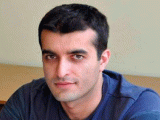South Caucasus Network of Human Rights Defenders
Prisoner of Conscience – Case of Rasul Jafarov

[04.02.2015]
On January 27, a preparatory hearing was held in Baku Grave Crimes Court, on the case of human rights defender, founder and chairman of Human Rights Club Rasul Jafarov.
Monday, 02 February 2015, by Magazine Liberali
January 27, Baku, Azerbaijan, corner of Vurgun Street. The number of people at the side entrance to the court discussing particularly grave cases is increasing – citizens, foreign observers and journalists are waiting for the trial of the Azerbaijan human rights defender Rasul Jafarov. Everybody tries to be closest to the door – the trial might be scheduled in such a small courtroom that not everybody will manage to enter. The local journalists say it often happens there.
The three-stories building resembles more of a residential block than a court. After one-hour the door opened, and after leaving passports and cell phones people are allowed to go upstairs. The audience entered the inconvenient, long and narrow courtroom on the second floor.
The room is divided in two parts by a wooden bar – at the end of one part there is a long desk for the judge. The court uses the iron-barred place on the left side when several persons are being accused. However, today only Rasul Jafarov is sitting there. On the right side there are tables and chairs. Lawyers, witnesses and accused are sitting there together. However, the prosecutor’s table is standing close to the judge, on an eminent place. Prosecutor Mubariz Miril represents the side of the plaintiff in Jafarov’s case.
Two lawyers of the accused person are sitting at the first table. There are four victims behind them – Anar Jabiev, Ahmed Neibatov, Jahangir Ahmadov and Nijat Imranil.
In the second part of the courtroom there are chairs for the audience.
Judge Eldar Ismaylov and his two assistants entered the room and everybody stands up. The trial started. The judge clarified the rights to the accused person and read the accusation.
Lawyer and founder of the non-formal group Human Rights Club, Rasul Jafarov, is accused of illegal entrepreneurship (Article 192 of the Azerbaijan Criminal Code), evasion from payment of taxes (Article 213), abusing official power (Article 308), assignment of other person’s property (Article 179.3.2) and service forgery (Article 313).
Rasul Jafarov does not plead guilty. The grounds of the accusations are vague for him. He requests more clarifications from the prosecutor’s office. The prosecutor claims the investigation was properly conducted. The investigative bodies examined Rasul Jafarov’s organization, so the accusation is clear and well- grounded. The prosecutor clarified to Rasul that his activities were illegal because he wasted the funds received from foreign donors without registration of his organization and the grants.
The lawyers requested to free Rasul from iron bars, to impose domestic imprisonment on him, to speak in the microphone and to grant witness status to the victims.
The prosecutor did not agree on any solicitations from the defense side and requested the court to reject them.
Judge Eldar Ismaylov upheld only one solicitation and allowed Rasul to sit next to his lawyers.
The local lawyers clarified giving preference to the prosecutor’s office and rejecting solicitations from the defense side, and in general solicitations are part of the Azerbaijan court tendency. The seats assigned for the sides in the courtroom also prove this approach.
The judge did not agree to the solicitation of the defense side about the witness status even after the victims also requested it. Three of four victims sitting in the courtroom said that Rasul did not do them any harm and wanted them to be witnesses in the case. The fifth victim was not in the courtroom but as we learned during the trial he also requested to cancel his victim status in the case. Only one victim did not share their position and stated that Rasul did not pay office rent to him.
The lawyers cannot understand how the accusation can be formulated in this case if four out of five victims deny the allegation that Rasul did them harm.
“It abolishes all accusations and all findings become illogical. It is unclear what it is based on,” an Azerbaijan lawyer said about the issue of the victims in the case, which prefers to stay anonymous due to security means.
The trial is approaching the end. The judge left the courtroom for a short time and then returned to announce the plans for the next trial. On February 10, the substantial hearing of the case is scheduled – the court will study the evidence in the case and hear statements of the accused, witness and victims.
***
30-year-old Azerbaijan human rights defender Rasul Jafarov founded Human Rights Club on December 10, 2010. He was leader of the campaigns Sing for Democracy and Art for Democracy.
One of the main issues Rasul Jafarov usually advocated and even made a speech about at the Council of Europe, was the issue of Azerbaijan political prisoners.
His activities as a human rights defender, were often reported as a campaign against Azerbaijan authority and Alyev’s government by some media sources. Local media outlets often mentioned him as an US agent, which promoted revolution in the country in exchange of multimillion grants. Politicians also shared this position.
On August 28, 2014 during his meetings with youth in the regions, President of Azerbaijan blamed human rights defenders in selling their conscience. “We have betrayers in the country, who have sold their honesty.”
General Prosecutor’s Office launched a criminal case against Rasul Jafarov in May 2014. On July 7, based on the court judgment, his bank accounts were sequestered. On July 25, based on the court judgment, travel ban was imposed on him. Rasul Jafarov was summoned to the prosecutor’s office for interrogation several times. On August 2, his status was changed during the interrogation. He was arrested and sentenced to three-month pretrial detention.
In accordance to the August 4, 2014 statement of the press-center of the General Prosecutor’s Office, Rasul Jafarov received the funds from foreign donors as a physical person, did not register the expenditures and avoided tax-payment. “Financial monitoring service discovered shortcomings in the bank operations of the Human Rights Club in the Central Bank. One of the founders and chairman of the organization was Rasul Jafarov. According to the judgment, the organization was examined. There is well-grounded doubt that Rasul Jafarov did not register the grants received from American and other foreign donors. The total amount of the grant was 147 900 manat; through evasion of tax payment he damaged the state budget with 6 162 manat.”
The lawyers clarified that Jafarov acted as a physical person because Human Rights Club was not registered as an NGO. According to them, Rasul participated in different projects as a coordinator. Consequently, he was not obliged to pay money to the state and could not abuse his official power either. If the accusation is proved, Rasul Jafarov faces 12-year-imprisonment. International organization Amnesty International announced him to be a prisoner of conscience.
Legislative amendments and detention of other local human rights defenders preceded the detention of Rasul Jafarov. On December 17, 2013 the Parliament of Azerbaijan passed a set of legislative changes referring to the non-governmental organizations, grants and taxes that significantly restricted the activities of NGOs. According to the amendments, every grant must be registered, and it can be issued only after the Ministry of Justice approves the grant agreement. Working with unregistered grant is an administrative offence, but the court can declare the funds as personal property and impose criminal liability on the grantee for having avoided the tax-payment.
On March 17, the Central Bank prohibited to issue non-registered grants, and over ten NGOs had their accounts blocked.
In 2014 President of Azerbaijan signed legislative amendments that allowed the government to bank activities of local or foreign non-governmental organizations in the country. Violations of the law are punished by fines.
After that, criminal cases were launched against more than ten non-governmental organizations.
On July 30, 2014 the director of the Institute for Peace and Democracy and member of the General Assembly of the World Organization against Torture, Leyla Yanus, was arrested and sentenced to three-months pre-trial imprisonment. She was accused of high treason, forgery, fabrication of documents, evasion of tax payments and illegal entrepreneurship. Her husband Arif Yanusov was also charged but he was arrested a bit later, on August 5 and sentenced to three-months pre-trial detention.
On August 8, 2014 human rights defender and chairman of the Legal Education Society, Intigam Alyiev, was also arrested. He was accused of the evasion of tax payment, abuse of power and illegal entrepreneurship.
On December 16, 2013 chairman of the non-governmental organization Election Monitoring and Democracy Studies Center (EMDS) , Anar Mammadli, was accused for evasion of taxes, illegal entrepreneurship and abuse of official power. In May 2014 he was sentenced to imprisonment.
Alongside the local and foreign media sources, international human rights organizations such as Amnesty International and Human Rights Watch, as well as the Foreign Ministry of Poland also responded to the fact that they are being arrested. They all believe the accusations against them were politically motivated and are connected with their human rights activities.
Ketevan Gvedashvili
Təqvim
Arxiv
|
||||||||||||||||||||||||||||||||||||||||||
|

